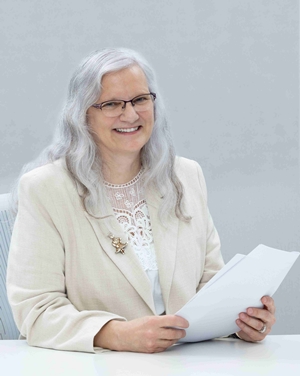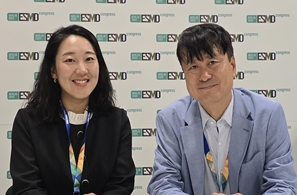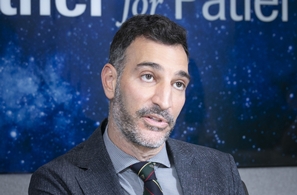- UCB "Korea is a key country globally…patient access"
- by Hwang, byoung woo | translator Hong, Ji Yeon | Nov 11, 2025 06:08am
The trend is a 'regulatory science approach' that goes beyond simply meeting approval requirements. It now involves incorporating patient-reported treatment experience and quality-of-life (QoL) measures into regulatory and evaluation processes from the early stages of development.
In line with the current trend, UCB is restructuring its global regulatory strategies, focusing on a patient-centric approach across clinical design, evaluation variables, and regulatory cooperation.
DailyPharm met with Susanne Dorn, Senior Vice President and Head of Global Regulatory Affairs at UCB, to discuss the shift toward patient-centric regulatory strategies and the direction of collaboration in the Korean market.
Changes in regulatory strategy, strengthening patient-centric access

She said, "In rare and intractable diseases, it is difficult to secure sufficient evidence using conventional clinical trial designs alone," and explained. "Therefore, an approach that sets the actual difficulties and burdens experienced by patients and their families during the treatment process as variables in the clinical design stage is becoming critical."
According to Dorn, UCB is incorporating everyday patient experiences, such as the degree of functional recovery, the burden of taking medicine, and the long-term sustainability of treatment, into its clinical trial endpoints.
She said, "UCB sets investment priorities and establishes strategies to simultaneously meet regulatory requirements and deliver tangible value to patients during the drug development process," and emphasized, "The patient's story is not just a reference, but it is the motivation and starting point for why we must continue developing this therapy."
Dorn also noted the expansion of the regulatory environment toward Regulatory Science, shifting from an approval-procedure focus to one centered on scientific evaluation.
"Given the increasing complexity of diseases, it's crucial to set appropriate endpoints and find the optimal pathway from the product development stage," she stressed. "In areas where the total population is small, such as rare diseases or pediatrics, an efficient evaluation design that maintains scientific evidence is necessary."
It means that the importance of developing faster, more efficient evaluation methods while maintaining scientific integrity through collaboration with regulatory authorities aligns with the discussion of utilizing Real-World Data (RWD).
Dorn added, "Regulatory agencies in various countries are actively considering new evaluation methods like expedited approval, and UCB is collaborating closely with them."
"Korean approval success provides crucial global insights"
UCB's regulatory perspective is drawing attention because the company has recently achieved success in new drug approvals in Korea.
Starting with the psoriasis treatment Bimzelx (approved August 2024, reimbursed June 2025), the company has continued its success with the systemic myasthenia gravis treatments Zilbrysq (approved November 2024) and Rystiggo (approved April 2025).
Regarding these successes, Dorn said, "Korea is a vital country in the global market, and we are extremely proud of the achievements made in the short span of the last one or two years. We see the effort to resolve unmet needs through a patient-centric approach in neurology and immunology as highly exemplary."
UCB is pursuing collaborations that leverage the environments and strengths of each country in line with its global strategy. The recent experience in Korea is considered crucial for the execution of the global strategy.
"Based on these experiences, we are deliberating on how to implement successful cases from the U.S. and Europe even more effectively in the Korean market," she emphasized. "This visit to Asia is also intended to broadly understand institutional differences between countries and further strengthen global collaboration."
UCB is also currently preparing for the domestic approval of its Dravet syndrome treatment candidate. The drug has been selected as a target for the MFDS's Concurrent Approval-Evaluation-Negotiation Pilot Program, which is noteworthy.
Dorn stressed, "Dravet syndrome is a severe intractable disease that impacts the entire daily life of not only the children affected but also their caregivers and siblings. The treatment goal is not just to reduce seizure frequency and manage comorbidities but also to restore the family's quality of life."
She said, "Access to innovative treatments is not only a matter of drug price or budget discussions; it is a matter of the time remaining for patients," and added, "UCB will collaborate with Korea's institutional efforts and do its utmost to create an environment where innovative treatments genuinely change the lives of patients and their families."
Dorn concluded by stating that the global headquarters and the Korean branch will work closely together to expand patient access to patient-centric, innovative treatments continuously.
"Our goal is to create an environment where Korean patients can rapidly benefit from innovative treatments through efforts, including regulatory collaboration and clinical evidence generation," she added. "UCB will continue to accurately identify unmet patient needs and fulfill its role as a partner contributing to the improvement of the treatment environment."
-

- 0
댓글 운영방식은
댓글은 실명게재와 익명게재 방식이 있으며, 실명은 이름과 아이디가 노출됩니다. 익명은 필명으로 등록 가능하며, 대댓글은 익명으로 등록 가능합니다.
댓글 노출방식은
댓글 명예자문위원(팜-코니언-필기모양 아이콘)으로 위촉된 데일리팜 회원의 댓글은 ‘게시판형 보기’와 ’펼쳐보기형’ 리스트에서 항상 최상단에 노출됩니다. 새로운 댓글을 올리는 일반회원은 ‘게시판형’과 ‘펼쳐보기형’ 모두 팜코니언 회원이 쓴 댓글의 하단에 실시간 노출됩니다.
댓글의 삭제 기준은
다음의 경우 사전 통보없이 삭제하고 아이디 이용정지 또는 영구 가입제한이 될 수도 있습니다.
-
저작권·인격권 등 타인의 권리를 침해하는 경우
상용 프로그램의 등록과 게재, 배포를 안내하는 게시물
타인 또는 제3자의 저작권 및 기타 권리를 침해한 내용을 담은 게시물
-
근거 없는 비방·명예를 훼손하는 게시물
특정 이용자 및 개인에 대한 인신 공격적인 내용의 글 및 직접적인 욕설이 사용된 경우
특정 지역 및 종교간의 감정대립을 조장하는 내용
사실 확인이 안된 소문을 유포 시키는 경우
욕설과 비어, 속어를 담은 내용
정당법 및 공직선거법, 관계 법령에 저촉되는 경우(선관위 요청 시 즉시 삭제)
특정 지역이나 단체를 비하하는 경우
특정인의 명예를 훼손하여 해당인이 삭제를 요청하는 경우
특정인의 개인정보(주민등록번호, 전화, 상세주소 등)를 무단으로 게시하는 경우
타인의 ID 혹은 닉네임을 도용하는 경우
-
게시판 특성상 제한되는 내용
서비스 주제와 맞지 않는 내용의 글을 게재한 경우
동일 내용의 연속 게재 및 여러 기사에 중복 게재한 경우
부분적으로 변경하여 반복 게재하는 경우도 포함
제목과 관련 없는 내용의 게시물, 제목과 본문이 무관한 경우
돈벌기 및 직·간접 상업적 목적의 내용이 포함된 게시물
게시물 읽기 유도 등을 위해 내용과 무관한 제목을 사용한 경우
-
수사기관 등의 공식적인 요청이 있는 경우
-
기타사항
각 서비스의 필요성에 따라 미리 공지한 경우
기타 법률에 저촉되는 정보 게재를 목적으로 할 경우
기타 원만한 운영을 위해 운영자가 필요하다고 판단되는 내용
-
사실 관계 확인 후 삭제
저작권자로부터 허락받지 않은 내용을 무단 게재, 복제, 배포하는 경우
타인의 초상권을 침해하거나 개인정보를 유출하는 경우
당사에 제공한 이용자의 정보가 허위인 경우 (타인의 ID, 비밀번호 도용 등)
※이상의 내용중 일부 사항에 적용될 경우 이용약관 및 관련 법률에 의해 제재를 받으실 수도 있으며, 민·형사상 처벌을 받을 수도 있습니다.
※위에 명시되지 않은 내용이더라도 불법적인 내용으로 판단되거나 데일리팜 서비스에 바람직하지 않다고 판단되는 경우는 선 조치 이후 본 관리 기준을 수정 공시하겠습니다.
※기타 문의 사항은 데일리팜 운영자에게 연락주십시오. 메일 주소는 dailypharm@dailypharm.com입니다.
- [Reporter’s View] ‘Selection & Focus’ to foster K-Bios
- Reporter's view | Hwang, byoung woo









